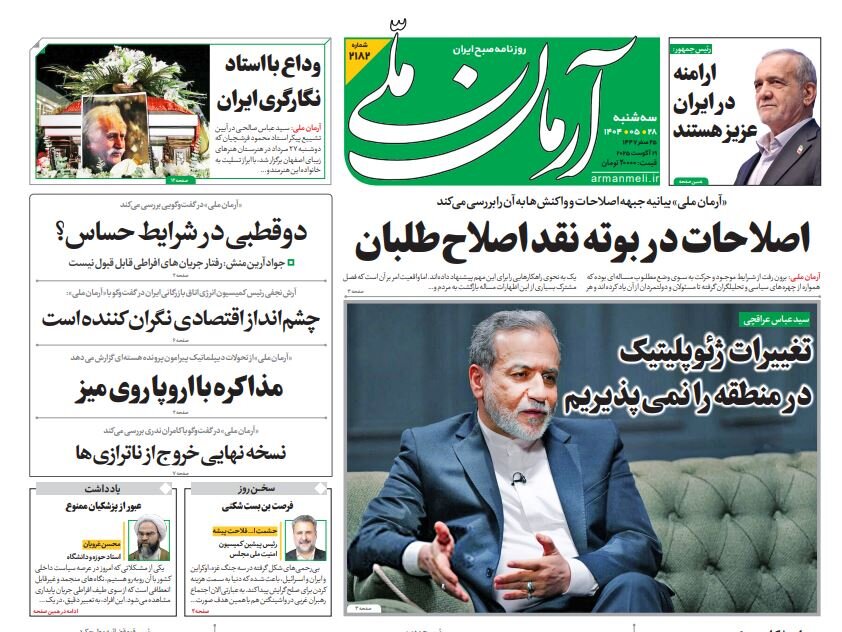Increasing power through economic development

TEHRAN - Arman-e-Melli discussed the Trump–Putin meeting in Alaska in an interview with international relations analyst Fereydoun Majlesi.
Majlesi noted that both Putin and Trump seek stability in Iran, albeit from two very different perspectives. Should this be achieved, it would benefit not only Iran, Russia, and the United States, but also the wider region. At present, all countries in the region are grappling with heightened tensions. If such meetings lead to the lifting of sanctions and Iran’s reintegration into international trade, the advantages would be considerable. In pursuit of its national interests, Iran could adopt a flexible and constructive stance, moving firmly along the path of economic development. Economic growth, in turn, would naturally foster progress in other areas. Majlesi emphasized that any nation should maximize its economic strength as the foundation for enhancing military capability. He also highlighted the country’s pressing need for investment—whether domestic or foreign. Given current conditions, the foremost requirement for attracting foreign investment is peace and security, as even the smallest sign of escalating tension could drive investors away.
Shargh: Security in the South Caucus is Iran’s red line
In a note, Shargh discussed Mr. Pezeshkian's important visit to Armenia and said: Iran, as a major player in the region and neighbor to the South Caucasus, emphasizes that the stability and security in the region is the red line of the country' in terms national and security interests. Therefore, Tehran, while welcoming peace agreements and regional diplomatic efforts, explicitly prevents any trans-regional moves that would complicate the situation. The Iranian President's visit to Armenia is not only a symbol of the historical and cultural ties between the two nations, but also an opportunity to expand cooperation in the fields of infrastructure, energy, and transportation. A closer look at recent developments and diplomatic talks between Iran and Armenia shows that Tehran is playing an active and intelligent role in shaping the South Caucasus’s future. Iran is well aware that security in the region is directly linked to its security, and by establishing strategic cooperation with Yerevan, it will not only remove potential obstacles but also pave the way for sustainable and peaceful development in the South Caucasus.
Jam-e-Jam: Proposed scenarios for deepening ties
Jam-e-Jam analyzes proposals to deepen ties between Iran and Armenia. It wrote: Based on the history of Iran-Armenia relations, the current situation, and regional and international trends, several scenarios can be proposed to deepen relations between the two countries. One of these proposals is to develop economic and infrastructure cooperation. Completing the North-South Corridor as quickly as possible through investment in the Iran-Armenia-Georgia route, building and launching infrastructure projects to meet the country's basic fuel needs, and economic connectivity are among the most significant economic projects that can be pursued between the two countries. Another proposal is strategic and security cooperation; forming a joint security working group to monitor developments in the Caucasus, especially the Zangezur Corridor; holding annual joint military maneuvers with the presence of Iran and Armenia; strengthening intelligence cooperation to counter the influence of the United States and some other regional and trans-regional countries. These measures can increase Iran's deterrence power and maintain regional stability.
Iran: Transparency of legal protocols and intensification of Iran's role
In an article, the Iran newspaper reviewed Pezeshkian's trip to Armenia and wrote: The emerging developments in the South Caucasus, especially the recent agreement between Armenia and the Republic of Azerbaijan and the direct role of the United States in it, are a turning point in the geopolitical relations of the region. In the new environment, Iran must change its position of mere opposition to Western projects to a policy of demanding transparent laws and protocols. It must inform regional and trans-regional parties of its red lines and be ready to respond decisively to any change, like misusing transit routes for military purposes or intelligence activities. This new approach presents Iran as a defender of legal stability and transparency in the region and, in addition to creating the possibility of bargaining, increases the scope of Iran's presence in regional dialogues. The formal demand for implementation protocols for the new routes, operational review of border and customs control methods, and assurances that sensitive goods do not pass through these routes should be proposed and pursued both in bilateral consultations with Armenia and in regional multilateral interactions. This policy opens up many ways for gaining further concessions in exchange for the implementation of this project.
Leave a Comment